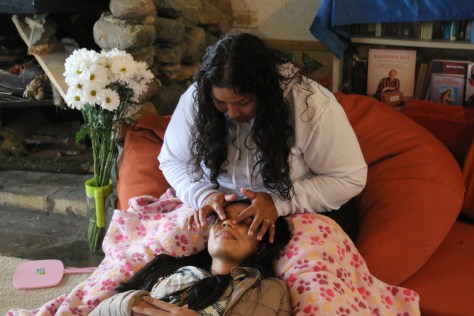“As women we are diverse and today we come together amid that diversity.” Those were the opening words at the Gathering of Women Defenders organized by PBI Colombia, held in La Vega this past 24 to 27 of February. Colombian women, from their Indigenous, Afro-descendant, and mixed-race ancestry of resistance have taught us something essential about protection: it is also necessary to protect our spirit, our sense of being, our center, our essence.

This protection is not as visible as a fence or armored car, but it sustains organizational efforts as roots hold up a tree. Many scientists now talk about the importance of roots in primary forests, how they are intertwined with the roots of other trees as a greater community that accompanies the forests, from underground.

We have also been shown how these roots, thanks to mycorrhiza, transmit information that keeps the forest healthy and favors growth in the smallest and sickest trees. This paradigm shift is still pending within the western perspective; an understanding of the connection between humans and nature (the nature that we carry inside us and the external nature that cares for us). This language reaffirms what women, Indigenous, and Afro-Colombian peoples have been saying for so long: there is so much beyond what our eyes see.

Protecting our roots is protecting what remains invisible yet sustains us. Roots sustain the trunk, hold the earth in place, and maintain the forest even when it is burned. “If the forest burns, let it burn, that same vine will sprout again,” as a song states. This also happens with protection, strong and collective roots are part of the protection that we provide as individuals, communities, and organizations.

There are many ways to protect our essence, depending on our world vision and culture, depending on our history. Through the many spaces that PBI Colombia has shared with women leaders, defenders, and organizations we have identified the importance of once again asking ourselves: What keeps us united in our efforts? What are our values? What connects us to life and the defense of rights and the territory?

Sociopolitical violence and abrupt and unexpected transformations, such as the pandemic, can lead us to lose sight of the horizon we are moving towards and where we came from. It can put us in a state of emergency, reacting to events. And over time we can lose that profound “why” in the essence of what we do and our connection to life.

We want to highlight three paths to protect that essence, which we identify as powerful, necessary, and inspirational

First, a coming together of the generations to dialogue on how we understand the values that sustain us as a community or organization and that connect us to the defense of human rights; second, the space for and vindication of our own culture, with the symbols, rituals, songs, languages, or education that comprise it; and third, a collective and creative construction of memory.

This dimension of protection, at times invisible, is fundamental, and like all the other dimensions it must be taken care, even when it is underground. For that reason, today on 8 of March, the international day for the rights of women workers and girls, we ask ourselves once again: Why do we continue accompanying after 27 years in Colombia?

Perhaps, as is reflected in the etymological meaning of spirit, it is because it helps us breathe. After all, it gives us air to walk the path of constructing spaces built on solidarity, peace, and friendship. Breathing in collective, with other women, allows us to recognize ourselves in others, to strengthen the invisible network of which we are a part, constructing safe spaces out of vulnerability and interdependence. Today, 8 of March, we do not want to forget all of the contributions made, day in and day out, by women leaders and defenders to understand protection from a holistic lens, understanding that protection and care always go hand in hand. A very special thanks to all the women, women leaders and human rights defenders, who inspire us every day.

PBI Colombia.

